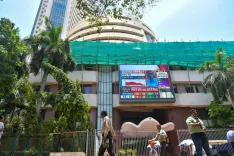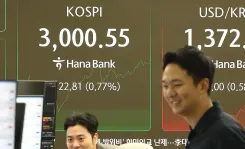Did Domestic Investors Infuse Rs 94,829 Crore in August, the Highest in 10 Months?

Synopsis
Key Takeaways
- DIIs invested Rs 94,829 crore, the highest in 10 months.
- FPIs reported net outflows of $4 billion.
- Inflation is at its lowest in over eight years.
- Robust GST collections indicate economic strength.
- New equity listings increased despite a drop in debt fundraising.
Mumbai, Sep 15 (NationPress) Domestic Institutional Investors (DIIs) have effectively balanced out the Foreign Portfolio Investor (FPI) sell-off in August, achieving their 25th straight month of net inflows with a remarkable investment of Rs 94,829 crore (approximately $10.8 billion) — the highest recorded in the past ten months, as detailed in a recent report.
In contrast, FPIs were net sellers in the Indian equity market, reporting net outflows of $4 billion in August, marking the most significant exit in seven months, according to the ‘Market Pulse’ report by the National Stock Exchange of India (NSE).
The Indian stock market faced continued selling pressure in August, attributed to stringent US tariffs that spurred a sell-off by FPIs.
“The fiscal deficit is showing signs of consolidation, and monthly GST collections are notably strong. There’s also an increase in capital expenditure, underscoring a commitment to long-term growth,” the report highlighted.
Inflation has dipped to an over eight-year low, falling beneath the Reserve Bank of India's (RBI) target, with the RBI anticipated to remain data-driven in its forthcoming rate decisions.
While corporate profitability demonstrated a rebound in the first quarter of the fiscal year, there have been downgrades in consensus earnings estimates, although the pace of these revisions has slowed.
The energy sector emerged as a notable exception, enjoying upgrades that significantly counterbalanced declines in other sectors such as Consumer Discretionary, Materials, and Financials, the report stated.
Listed companies, though fewer than their unlisted counterparts, make a disproportionately large contribution to corporate tax revenues, which has generally mirrored GDP growth.
New equity listings surged in August, although debt fundraising saw a decline, reaching a 16-month low. New investor registrations have decreased, even as the total registered investor base nears the 12 crore milestone, according to the report.
Trading in the derivatives market was selective last month. Interest rate futures experienced a notable increase in average daily turnover, while equity options exhibited a drop in notional open interest.
Commodity futures reached record highs, primarily fueled by electricity futures contracts.
“India’s external situation remains stable. Forex reserves hovered around the US$700 billion mark in August, and the volatility of the Rupee has been well-contained,” the report noted.
Monsoon activity has intensified, with robust reservoir levels and sowing activities nearing completion. Cumulative rainfall from June 1 to September 5 was recorded at 8.8 percent above normal.









